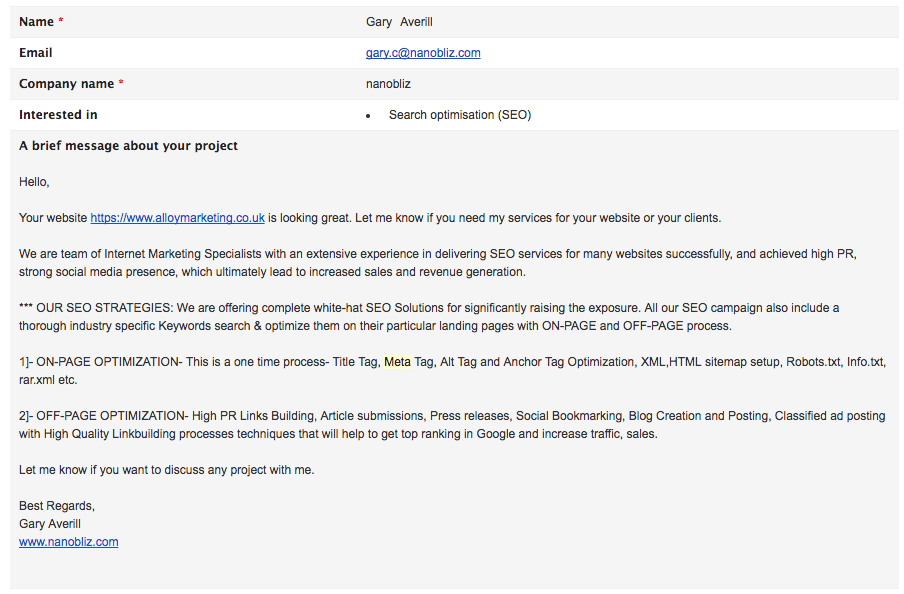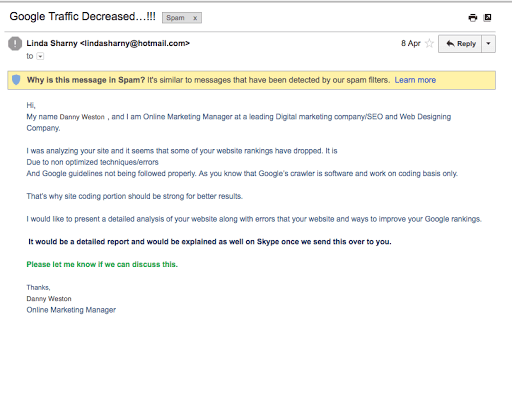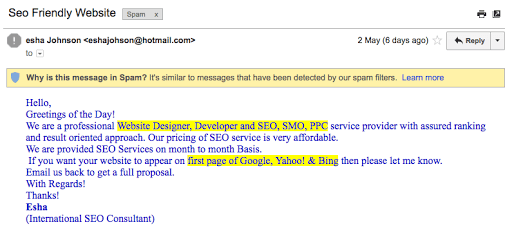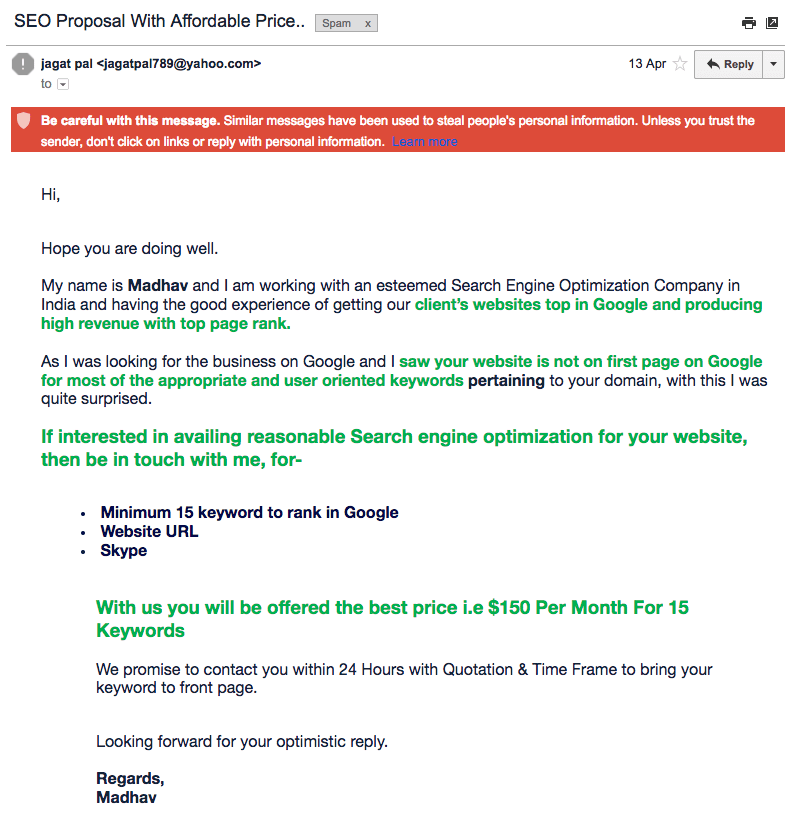Ever had a message through your website offering amazing SEO? Maybe it’s someone who’s found a million and one problems with your website, or someone who can guarantee they will get your website ranking in position 1 in no time at all. Unfortunately, if it looks too good to be true, it probably is!
Spam happens
Many businesses use enquiry forms on their to enable new and existing customers to get in touch. Our one looks like this:
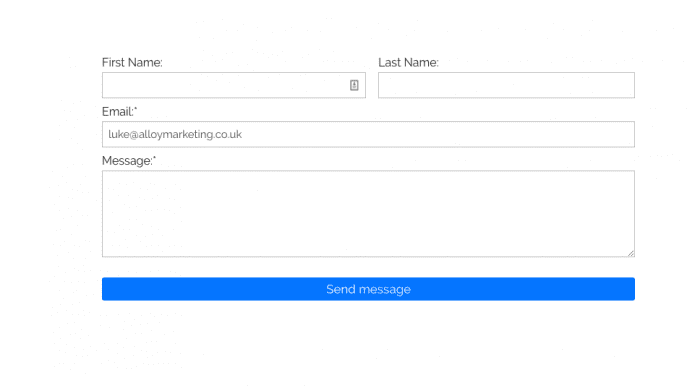
This is a much better system than just sticking your email address on the website for a number of reasons. Once your email address is out there, there’s no way to stop people sending you spam. A contact enquiry form such as this can be set up to stop “bots” automatically sending you tons of spammy messages, as well as being great for tracking how many people get in touch.
How to spot spam
There are of course going to be many different types of spam. If in doubt, treat something as spam until you have good reason not to. Some spam may look like it’s from a fairly plausible business, here are some examples of spam message we received to our website:
Don’t worry about the layout, a spam message will look like any other message submitted through your website but there are a few telltale signs that it is spam:
- Offer of services. The main reason for an enquiry form is for someone who wants to buy your services. If an unsolicited offer of services reaches you through the enquiry form, it’s likely to be spam. Of course this depends on your site so use common sense. Starting with a compliment doesn’t negate the unasked for advice here.
- Offer of loads of customers/high ranking positions/loads of web traffic. Who doesn’t want to grow their business? Of course it’s easy to have your interest piqued by an offer of more business, but use common sense. If offered snake oil in market square, you’d be skeptical that it could cure your ailments. It’s true that SEO can help businesses grow, but only when it’s done properly.
- Poor spelling and grammar. Every one of these messages includes some unnatural sounding language. This is a strong trend we see in such messages, although they also crop up in legitimate messages too but if you spot something that sounds strange be careful to look more closely.
- Dodgy email and website address. If it’s from a yahoo, gmail or hotmail email account it’s not likely to be form a real business. One of these examples isn’t as obvious as this, but “Nanobliz” isn’t a word is it? Often spammers resort to using completely incoherent strings of numbers and letters as they are forced to generate new, cheap email addresses as they keep getting blocked. Keep an eye out for addresses that end in strange letters that aren’t .co.uk or .com. Did you spot the “.online” domain name?
- Claims about your website. If you get a message in your inbox claiming to have found “X issues with meta titles” and “Y loading errors” on your website treat with extreme caution. These numbers are most likely just plucked out of thin air. While a reliable SEO agency will spend time and utilise expensive auditing software, to identify and deal with these sorts of issues which can be mentioned in spam, unless you see a legitimate report, don’t worry about these made-up figures.
- Claims about your ranking performance. As with assertions about the performance of your website, take any claims about the current performance of your website with a pinch of salt large enough to grit a motorway in a blizzard. When we do SEO we track a website’s performance we use loads of carefully researched and selected keywords in advanced, 3rd party tracking software to give the fairest possible assessment of the situation, it’s a technical and time consuming job, where as throwing a couple of numbers in a message doesn’t take any time at all. If someone claims “your website could perform better” this may be true but be careful to make sure there is real evidence for this claim.
- Not a real business. If a message has passed all these tests, then it may be time to do some more in depth research. See if you can find evidence that they are a legitimate business, they should be in Companies House if they are a legitimate company in the UK. Or just put their business name into Google, if they’ve conned anyone else there could well be evidence for this online.
Ask yourself: can this person be held responsible for their claims?
What can happen if you respond to spam
It’s impossible to say what will happen for certain, however as an experienced SEO agency we have seen a few common outcomes:
- A quick boost, followed by a long fall. If the spammer carries out “blackhat” (against Google’s rules) SEO, for example creating loads of links to your website from a fake link network rather than from real high-authority websites, you may see a temporary spike in performance. But sooner rather than later Google catches onto these attempts to cheat the system, resulting in harsh ranking penalties, costing you the effect of any legitimate SEO you’ve had done too.
- Malware gets installed on your website. Granting any kind of access to a spammer exposes your website to being infected with malware – computer viruses and so on. If Google spots spam on your website you can say good bye to your current ranking position as your website will be completely hidden from search results.
- You loose money. This is likely to be the outcome in some form or another. If you send money to someone you don’t know over the internet there is no way of knowing that they will carry out work that will actually benefit your business. At the very least you’d expect to see a proper contract before beginning work. That’s why we offer regular, third party generated reports which track the results of the work we carry out.
What to do about spam
- Set up your contact enquiry form more securely. Using systems like Captcha you can make it much harder for bots to auto spam you. However, you shouldn’t try to stop real human sending you a message,if you did, your customers wouldn’t be able to reach you. It may also be possible to tweak the spam filter settings, but turn them up too high and it might prevent a legitimate enquiry getting through. The exact tweaks to the form will depend on how your website is set up and what you use it for. If in doubt, get in touch to see if there’s anything we can do to help.
- Ignore it. It shouldn’t be too much trouble to delete the odd spammy message that get’s sent through to you. Yes, it’s annoying, but on the plus side getting more spam is generally an indication that your website is more visible. In our experience, there’s a correlation between getting more spam, and getting more customers.
Do better SEO
There’s lots you can do yourself to improve your website’s SEO performance. Our blog is full of tips and advice, explaining the basics and give you an idea of what you can do yourself. SEO is a key part of marketing for so many small businesses it’s very useful to get your head round the basics.
If you still aren’t sure what you can do about spam it may be time to call in the professionals. By working with a registered UK company such as Alloy, you know that we can held accountable for our work. We won’t make outlandish promises that we can’t keep, and we’ll keep in close contact with you, providing third party reports of the work that we do. SEO still takes time, but by investing with a company committed to long term, white hat SEO that makes real progress, get in touch with our team today.

